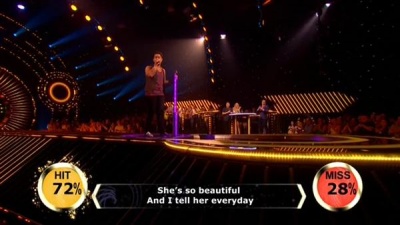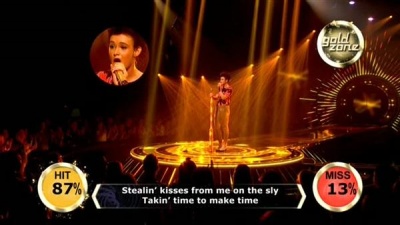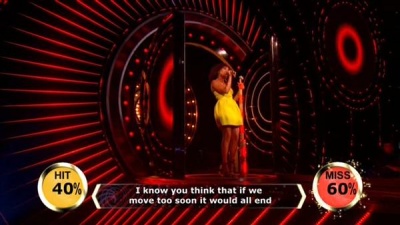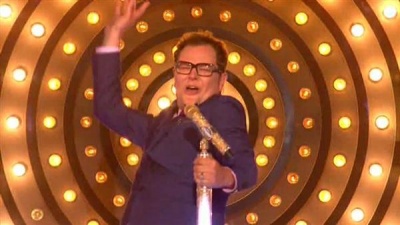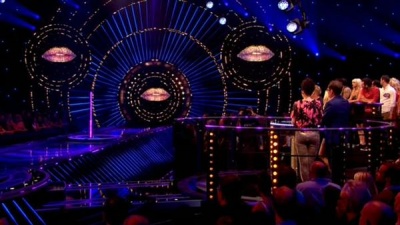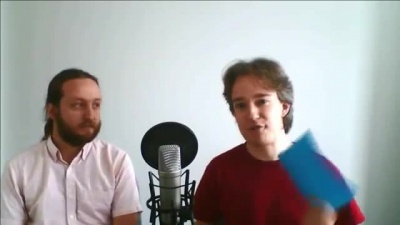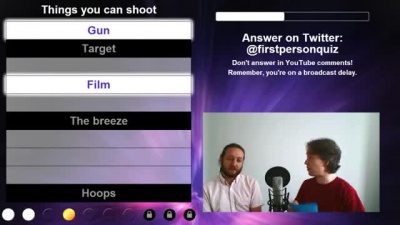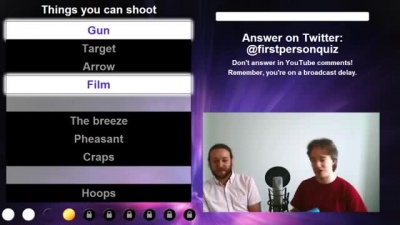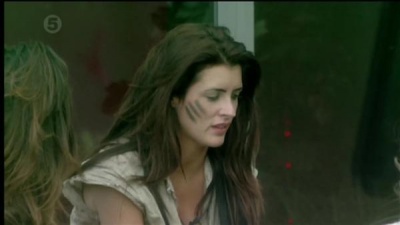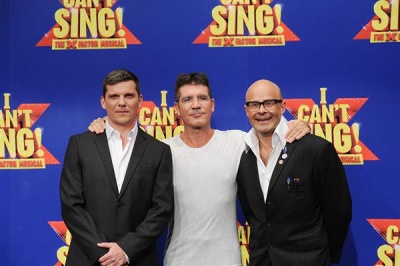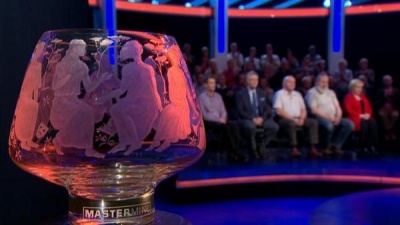Weaver's Week 2014-08-24
Last Week | Weaver's Week Index | Next Week
Later, we cross-examine a statement about Big Brother, and look at predictions for Mastermind. Our main review compares two appalong game shows: First Person and
Contents |
The Singer Takes it All
Initial and Remarkable Television (Endemol companies) for Channel 4, 1 – 22 August
Fridays in August have been interactive nights. Some watch Big Brother on Channel 5. Others prefer to spend Friday with Davina, and there's been a series of Million Pound Drop. Channel 4's also done something entirely different: a musical talent show.
The basic idea is this. Contestants will sing, and a jury will rate their performance. The best performance of the night gets to perform another song, and win some money. Poor performances may end early. The gimmick? The voting jury is the viewers at home, voting on their smart telephones and pill computers.
Each viewer has four votes, they can cast one vote in each Active Voting Segment. The only vote they can cast is "Hit" or "Miss"; the "Maybe" option is an abstention. Scores are updated every ten seconds, and expressed as a percentage.
The contestant stands on a small platform. The platform is on a conveyor belt, running almost the full length of the studio. When a contestant has a Hit score over 50%, the conveyor belt moves forwards, bringing them closer to the end of the belt and the Gold Zone. The belt appears to have three speeds, and a higher voting percentage makes the conveyor belt move faster.
But when a contestant has a Miss score over 50%, the conveyor belt moves backwards, taking them away from the Gold Zone and towards the Flaps At The Back. Should a performance be so unpopular that the belt runs out, the player will disappear in a massive puff of dry ice and will not be seen again.
People applied by recording themselves singing a song from a restricted list. Sensible idea: it's those songs they can clear for broadcast, and those that are mostly vocals, and allows consistent editing to show the same 40 seconds from each entry.
These recordings had to be made on Apple devices, and they had to be in portrait mode. But .. but .. didn't Charlie Brooker tell us it was utterly essential that all footage is filmed in landscape, otherwise it looks rubbish on television? He did. But he was satirising "advice" from KYTV "News", first with the misinformation since 1989.
The producers issued some invitations for episode 1. Again, sensible idea: the first thing people saw was likely to be a good performance, and not Very Amateur Hour. After that, everyone came up from the same route. The top scores when lines close on Wednesday morning go to the Friday show. They're singing a song determined (or approved?) by the producers.
The singers therefore tend to be good: the public has already given a stamp of approval. We don't think many of them could win The Pop Factor, we're not sure that many of them would want to win it. Even so, it's a treat when someone is able to nail a tricky song live on network television. And it's a horror when someone starts moving forward, hits a duff note, then sails into reverse.
Host for the show is Alan Carr, a Channel 4 entertainer. He has a certain style – flamboyant, camp, at times screechy. Mr. Carr divides opinion: some people love him, some really dislike him. We don't like his style, but we are able to tune him out and enjoy the programme without him. That's except for the bits where a contestant disappears through the back wall, and Mr. Carr has to fill for two minutes with his invited guest.
Of course there will be someone for the host to bounce off. Singers Pixie Lott and The Rizzle Kicks, comedian Rob Beckett, and Paddy McGuinness have all been special guests. These people contributed little to the programme. Singers weren't able to offer technical advice, comedians didn't get to overshadow Alan Carr, and Paddy McGuinness was a walking cliché machine.
A disembodied voiceover ("Lips", performed by Brenda Edwards) introduced each contestant and gave the scores. The winning factor was "time in the Gold Zone".
Star of the show, therefore, was the contestant. When someone connected quickly with the viewers, they could move forwards and establish a commanding score. When someone didn't connect, the viewers would dump them out. The technology worked – the conveyor belt never snapped, and the voting only fell over once.
The only problem with this show is that the night's winner is entirely determined in the opening seconds of the performance. A contestant may address the nation for ten seconds before they start singing. This helps prevent digital delays from influencing the result {1} and ensures everyone has many Active Voting Segments during the performance. A good first impression is necessary to ensure the conveyor belt starts moving forward at maximum speed. Because the conveyor cannot move forward past the Gold Zone, a player need only score 50% to remain there.
Someone starting at 80%, will reach the Gold Zone in twenty seconds. If they then drop to 51% for the remaining 70 seconds, they'll score the maximum time. Someone maintaining 65% throughout might take thirty seconds to hit Gold, and only score 75 seconds of success. That's in spite of getting more positive votes throughout their performance.
Anyway. Whoever spends the longest in Gold comes back, sings another song of the producer's choice, and wins cash for hitting Gold again. The maximum prize is £15,000.
The producers of The Singer Takes It All claimed 2 million votes on the first night, and about 15% of viewers have voted on their apps. This is about average for appalong entertainment: over on CBBC, both Ludus and Horrible Histories Gory Games have had about 15% of viewers joining in. {2}
For those of us who don't app, this is a watchable show. The performances are great, the hosting isn't to our taste but we see where it's going. It was entertaining enough to watch, but we wouldn't make a habit of seeing it. We suspect that the show is Endemol and Channel 4's strike against Rising Star, a show ITV expects to make in the new year.
{1} Digital television has a problem: it's never clear when "now" is. Satellite, cable, DTTV, and internet viewing all run some time behind the studio. This delay ranges from a fraction of a second for DTTV in London up to 15 seconds for some internet viewers. Most viewers have about a 2 second delay. This is another unwelcome artefact of the rush to digital, as analogue television travelled the country in fractions of a second.
{2} Voting requires integration with Twitter or The Facebook. The production notes say "it's the only way we can validate your votes." Oh, *auth*. The claim is bunkum. Seriously. We need to introduce this lot to proper OAuth, and stop pretending that two proprietary services are the entire internet.
First Person
Independently produced, 5 – 19 July
Fridays in July had an interactive thing of their own, the First Person quiz {1}. Tom Scott of the internet was in his eyrie at the top of Millbank Tower. In a makeshift television studio {2}, Tom introduced the player, and the word association game.
There's going to be a key word, and the player is to blurt out ideas that have something to do with that key word. Ten concepts have been selected by the devilish question setter, and the player's job is to match their target. Three matches in the first round, rising to five as they become more adept.
"But this is a rehash of Talkabout," we hear you cry. Well, not quite. While it's true that Tom Scott is as entertaining as Andrew O'Connor, Talkabout didn't ask its players to compete against hundreds of opponents.
How do they do that? By the magic of the internets. First Person is broadcast live. Viewers can play along, by sending their answers on Twitter. Should the viewer mention a topic that the contestants haven't reached, they lock it out and the players can't use it.
"This is unfair! There's one player and hundreds of people watching," is the next response. Yes. That's why First Person incorporates a broadcast delay. What goes out on the live broadcast isn't actually live, it's delayed by about 30 seconds. The player gets first dibs at the question, the internet can't strike for that first half minute. Also, the internet has less time to get its answers in – type it out, spell it with precision, all within a minute. The studio player has 90 seconds to brainstorm.
The format made an interesting experiment, and at three episodes we must consider July's series to be a pilot. It was a technical success; the broadcast didn't falter, answers were processed and popped up on screen automagically. By luck or judgement, the players were strong enough to take each programme to its conclusion, asking all five questions.
The strongest points were the host and the questions. Anyone can consult a thesaurus and come up with synonyms for "Seven". Anyone can consult a dictionary and come up with phrases including "Days in a week" and "Wonders of the World". It takes a witty and devious question-setter to leap all the way to "Sisters" and "Blake's". Another feather for David Bodycombe's cap.
Tom presents the show in a direct and forceful style. He manages to know what he's doing and make it look like he doesn't. He shuffles his cue cards, and ramps the tension up as he gets into the game. His enthusiasm is infectious.
As the weeks progressed, Tom naturally developed catchphrases to explain the rules. "Capitalisation doesn't matter but spelling does." "Don't leave comments on the video, we won't see them and they won't count." And he has a little game of identifying game show contestants from their small avatars.
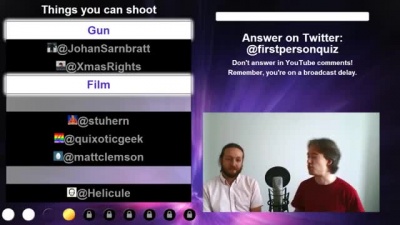 "An Only Connect avatar!"
"An Only Connect avatar!"
First Person was a no-budget game. It didn't run to an actual prize, though winners could claim eternal glory. No opening titles, no theme music, no tension bed as the time ticked on. We didn't miss these features, but would have liked some sort of 'ding', a signal for the end of the round. There's a good game in there, and it kept our attention for the full 20 minutes.
{1} We're not entirely sure if the show was called First Person, or First Person Quiz. Tom's conversation suggested First Person.
{2} A conference room.
/-/
Statement of the Week
Channel 5 has released a statement about voting in last week's Big Brother final. According to the statement, Ashleigh Coyle went into the final transmission with a lead of 7887 votes. Helen Wood had a 4631 vote margin when lines finally closed an hour later. This is consistent with host Emma Willis's claim at about 9.55 that "it's neck-and-neck", and this column's theory that Miss Wood's lead increased in the remaining minutes. A subsequent addition confirmed this: Miss Wood had the lead before the final vote, and increased her lead from 1194 to 4631 in the voting window.
This information, coupled with the report that Miss Wood's margin was 1.2%, does let us deduce the total number of votes cast. Between 370,500 and 402,700 votes were cast, and these central figures for each contestant may be wrong by 2800 either way:
- Pav Paul: 4055 (1.05%)
- Chris Wright: 18,649 (4.83%)
- Ash Harrison: 41,757 (10.82%)
- Christopher Hall: 55,060 (14.27%)
- Ashleigh Coyle: 130,878 (33.91%)
- Helen Wood: 135,509 (35.11%)
The original statement continued that viewers picked Pauline Bennet to be the "power housemate" on the opening night, and that Ms Bennet picked Miss Wood for a "reward" without knowing it was to be a pass to the final. This is cobblers: the official recordings go:
- "Pauline, the house is now complete, and you have 15 housemates. It is time to exercise your power. You will now grant one housemate a pass to the Big Brother final."
We asked the Channel 5 statement for a comment, explaining this clear inconsistency. The Channel 5 statement did not reply, seeing as how it's just some words on a piece of paper. During the early hours of Saturday, the statement changed from,
- "During the launch of Big Brother 2014, the viewers voted for Pauline to be given 'the power' in the House. Pauline knew nothing about what reward would be given to Helen when she selected Helen for a reward. The first either Helen or Pauline or any other housemate knew about there being a 'pass to the final' was when Big Brother announced to the House exactly what the reward was that Pauline had chosen Helen to receive."
It changed, with altered bits in italics:
- "During the launch of Big Brother 2014, the viewers voted for Pauline to be given 'the power' in the House. When she was selected as Power Housemate, Pauline knew nothing about what reward would be given to Helen. Big Brother did not know who Pauline would choose until she nominated Helen. The first Helen and the other housemates knew about there being a 'pass to the final' was when Big Brother announced to the House exactly what the reward was that Pauline had chosen Helen to receive. "
The Big Brother producers have made a significant error in their statement. The Big Brother producers have silently re-written history, without acknowledging their earlier error. We find it much harder to believe the rest of the statement, precisely because the producers are altering history. Are they channelling Winston Smith in the Ministry of Truth?
This column likes to give television people the benefit of the doubt, we assume that errors are the result of honest effort going wrong. But we must consider this position against the evidence. This is, at best, incompetent.
This Week and Next
Tom Baker, Colin Baker, Sylvester McCoy. We hear that the BBC has commissioned another run of The Regeneration Game, with Miranda Hart in the host's chair. This came as news to Ms Hart; she's been in discussions, but has agreed nothing. Wonder if Sue Perkins can step in and replace her?
We are going to see Prized Apart, an adventure series. Ten players go off to Foreign Parts, where they're put through Extreme Tests. The worst performers are flown back to Blighty where one of them will leave. But the person leaving is decided by how well friends and family do in a quiz round. It's certainly different. BBC1 Saturday evening as a replacement for Reflex, and it's developed by the Electric Ray company. That's headed by Karl Warner, himself a former BBC1 controller.
News from ITV's Revivals Department, and the next sausage is Stars in Their Eyes With Harry Hill. The singing show, where punters dress up as their idol and sing one of their songs, last aired in 2006. Harry Hill was last involved in music when the I Can't Sing musical closed earlier this year.
Local television news, and London Live has stopped making entertainment programmes. It's not clear if this will affect the prospects for Ctrl Freaks.
University Challenge welcomed St Peter's Oxford for their first appearance (team: John Armitage, Ed Roberts, Gabriel Trueblood, Spike Smith). Sussex are old hands, winning twice in the early years of University Challenge (team: Tom Whitehurst, David Spence, Joss MacDonald, Matthew Dean). A high-scoring opening phase ended when Sussex were asked about clouds and St Peter's about deconstructionist theory. One of them is a fluffy and nebulous confection in the sky, the other is a cloud.
By halfway, it became clear that St Peter's student Gabriel Trueblood is really good on the buzzer – he'll finish with ten starters. The team's not so great on the bonuses. Neither side recognises a picture of John Logie Baird; perhaps they needed to see Boo Boo. St Peter's continued to dominate on the buzzers, and won the game by 205-150. St Peter's look vulnerable in the second round, they'll need to do much better on the bonuses. Sussex might yet come back as high-scoring losers.
We hope they do, having been on the receiving end of three dubious decisions. This was marginal:
- Q: "How he lives beggars belief, constantly nicking old foreign necklaces." This sentence begins a mnemonic for the symbols of which well-known scientific progression? The number of words in the mnemonic totals 118.
- Sussex: Chemical elements
They were looking for "the periodic table".
Sussex were later fined for an incorrect interruption, though Paxman had just about finished enunciating the final syllable. And this was marked correct:
- Q: What links Winston Smith's residence in 1984, May 8th 1945, and Nelson's flagship at the Battle of Trafalgar?
- St Peter's: The letter V.
"Victory" was the model answer, and we don't think Winston's towers were ever called "V". On their own, all of these discrepancies are understandable; when combined, they have disadvantaged Sussex.
Some more tough questions on Mastermind.
Paula Keaveney won a game of three halves. She scored 13 (0) on The Thick of It. A previous contender, Paula knew the lie of the land, but not all of the answers; a pass spiral took her final score to 21 (4).
Cliff Morgan took The Music of Eric Clapton, reaching 13 (1 pass). In the general knowledge round, he suggested the prospect of a film version of the board game Risk, which we'd love to see. Cliff got his passes in early, finishing on 21 (4). That is a tie, and requires a five-question tie-break. Paula scored 3 in the tie-break with 2 passes. Cliff managed 1 correct answer with 2 passes.
The other contenders: Tim Allison answered on TE Lawrence, and managed a perfect round of 14 (0). This contender forgot The Beatles on his first general knowledge question, and passed on very many questions thereafter. A slight rally at the end took him to 19 (8). Stephen Peter had British Poetry 1940-70, where he scored 8 (4), and advanced to 16 (7).
Before the show, former winner David Clark posted a series of questions that he expected to come up in the specialist rounds, after a brief period of research. On TE Lawrence, 5 direct hits and 1 reversal (where the Mastermind answer is in his question, and part of the question is Mr. Clark's answer). Only slightly less predictable was Eric Clapton, 4 hits and 2 reversals. The Thick of It proved more detailed than a brief overview, Mr. Clark only had two hits. The dates for the poetry round were only revealed during broadcast, so we cannot compare notes. This is only a snapshot, Mr. Clark has a day job and will not be doing this every week, and it shows how deep the research is for some subjects, and not for others.
BARB ratings in the week to 10 August.
- Britain has a new favourite programme. The Great British Bake Off is back, with 8.5m seeing the opening cake.
- Tumble opened to 3.45m viewers, ahead of All Star Mr and Mrs (2.83m).
- Come On Down The Game Show Story began with 2.7m, beating new Tipping Point Lucky Stars (2.6m), Bake Off On Two (2.55m), and Dragons' Den (2.5m).
- The Singer Takes It All may only be pulling 1.08m viewers, but it's denting Big Brother – this Friday's eviction remained at 1.48m. Jonathan Ross attracted 910,000 to Million Pound Drop Live Not Live.
- 630,000 for Got to Dance on KYTV Europe UK, with Hell's Kitchen on ITV2 and Come Dine on More4 falling just under half a million.
Promoting the new series of The X Factor, Simon Cowell said that "you can't be a proper judge without hit artists." So, which performers has Mr. Cowell been involved with? Leona Lewis, yeah, good choice. Steve Brookstein. Who? Seriously, who?
The search for the champion of The Jump 2019 begins next Saturday at 8. Before, The Xtra Factor has the format's best bits (ITV2, 8pm, daily from Mon). Got to Dance is on for most of the week (KYTV Europe UK), and there's a new run of A League of Their Own (KYTV Europe UK, 9pm Fri). Saturday has more celebrity chefs on Pointless (5.30), followed by Tumble (6.15) and Break the Safe (8.15). The Chase With Celebrities returns at 7, and Through the Keyhole at 9.25. Celebrity lineups for both shows are embargoed, so we can only hint at them. Hmm. One's been mentioned earlier in the Week, another has had his catchphrase nicked by Mr. Obama of Chicago.
Photo credits: Initial and Remarkable Television (Endemol companies), Tom Scott, Initial (an Endemol company), Stage Entertainment UK and SyCo Entertainment, BBC Salford.
To have Weaver's Week emailed to you on publication day, receive our exclusive TV roundup of the game shows in the week ahead, and chat to other ukgameshows.com readers, sign up to our Yahoo! Group.


